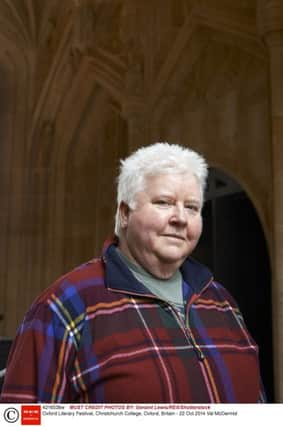Festival review: Aye Write!


Everyone loves Eardley because she was as passionate about her work as we want artists to be. We want them to be driven by their art, “bashing out paintings all the time” as Eardley was at Catterline, the fishing village south of Stonehaven she made her home and whose “infinite paintableness” obsessed her. In one letter, she wrote to her lover about how she was frightened of painting the salmon fishermen’s nets, but as the light was right, “I must go”. Such painterly exploration clearly also paid dividends in her famous paintings of street children in Townhead.
So why has Eardley’s reputation not also soared south of the Border? Dying so young really did make a difference, said Galastro, and the breast cancer that killed Eardley in 1963, aged 43, set in just before her growing reputation was firmly secured.
Advertisement
Hide AdJenni Murray, doyenne of Woman’s Hour since (gulp!) 1987 and Dame of the British Empire since 2011, is now 11 years free of breast cancer, and mentioned the fact with a triumphant yelp while taking her Glasgow Royal Concert Hall audience on a feminist trot through her personal selection of 21 women whose lives tell a history of Britain.
The selection ends, as indeed Britain might itself, with Nicola Sturgeon, but the one woman on the list whose story made me wince the most was the novelist Fanny Burney. In a letter to her sister, she described the mastectomy she had in 1811 after being diagnosed with breast cancer. There were seven doctors, no form of anaesthesia, and she was placed on a mattress with instructions she wasn’t to be held. A cambric handkerchief was placed over her face, but it was transparent. “Bright through the cambric, I saw the glitter of polished steel,” she wrote. At this point I should stop, as indeed did Dame Jenni, and point out that Fanny Burney lived for another 29 years after the operation.
Two good questions – “Who was the first feminist you ever met?” and “Would you have been a suffragette or a suffragist” – followed, and for the answer to the first we went back to her native Barnsley (who could even guess?). It was her French teacher, Mme Short, who sounds a bit like a south Yorkshire Jean Brodie, “a slight smell of body odour mixed with Je Reviens and so beautiful that the class all fell in love with her”. Mme Short insisted that her gals, when reading Flaubert’s Madame Bovary, had to take the side of poor Emma Bovary, whose position of utter powerlessness “we needed to analyse as feminists”.
Murray, who has the knack – invaluable for a broadcaster – of treating an audience of 400 with the same intimacy, naturalness and engagement as table of four, added that although she’s president of the Fawcett Society (of non-violent suffragists) she would also have been tempted to join the suffragettes, whose campaign for the vote used violence (although they pledged never to harm human life). “It’s both, really. But if I ask myself which one … I can just see myself chained to the railings.”
I could have got this wrong, but I can imagine Val McDermid, novelist and Woman’s Hour stalwart, joining her there. In September, McDermid will celebrate 30 years as a published novelist, and she was particularly good at explaining how she first started. As a busy tabloid news editor in Manchester, the only free time in which she could write was on Monday afternoons between 2pm and 7pm. The writer Mary Higgins Clark, she pointed out, bringing up five young children, had even less: just the one hour from 10pm-11pm. “But it’s a good idea to identify a chunk of time where you’re regularly free and at your most productive. If you won’t commit to yourself, how can you expect anyone else to commit to you?” Sound advice.
Here’s some more, culled from an engaging event with Bulgarian-born poet and writer Kapka Kassabova and Donegal mapmaker and writer Garrett Carr. Treat the periphery just as if it were the centre. Travel there – to Bulgaria’s once-forbidden border zones with Turkey and Greece in her case, and Northern Ireland’s wriggling frontier in his – talk to the borderland peoples, make allowances for their contrariness, listen to their stories, and take the pulse of the past. Stir in the mind, leave to settle, then write up with panache. And if you’re lucky with your timing, as these two are, you’ll find publication coincides with everyone suddenly worrying about soft borders turning dangerously, divisively hard.